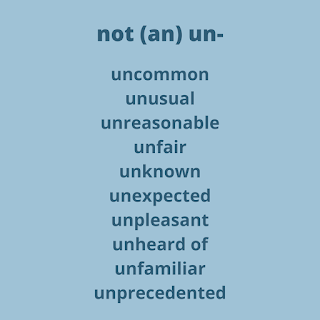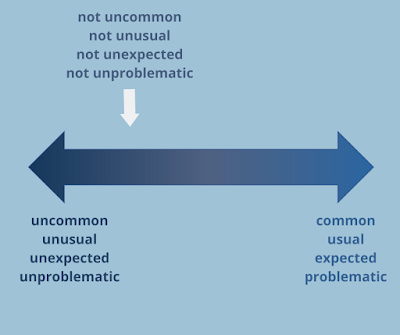Not such an uncommon pattern
I was recently researching the word unproblematic. Before I started looking at the corpus evidence, I expected that it was used to describe something that’s simple, straightforward, and uncontroversial, something that doesn’t throw up any problems. And it is, but …
As I scrolled down the concordance lines, sorting left and right as I often do when I first look at a word, I noticed a chunk of not unproblematic examples. It was a significant, but not huge proportion, so I made a mental note to investigate further when I’d dealt with the more obvious examples. As I started to look in more detail, it soon became clear that those straightforward examples, although they were there – The whole process was simple and unproblematic – were actually in the minority. What I did find was:
not unproblematic
However, the category of 'climate
refugees' is not unproblematic.
However, comparing evidence from
different surveys is not unproblematic.
This definition is not
unproblematic, as it seems to rest on circular reasoning.
However, this approach is not
unproblematic, since site reactions can cause distress to patients …
not an unproblematic + noun
Given related debates this is not
an unproblematic option either.
Of course, Twitter is not an unproblematic
representation of the population.
However, this is not an
unproblematic undertaking.
not + (a/an) + adverb + unproblematic
balancing school and extracurricular
activities is not always unproblematic
So student visas are not completely
unproblematic from this point of view.
it's not an entirely unproblematic
development from an editorial standpoint
The study was, indeed not wholly
unproblematic
I also concluded that the idea is not
so unproblematic as it might appear on first glance.
This popular mixed-mode design is not
altogether unproblematic from a measurement error perspective
Miscellaneous other negatives
However, the process has not been
unproblematic and has led to controversies
there can be cases where the merger cannot
be characterised as unproblematic in advance.
The situation should not be thought
of as unproblematic, though
That doesn't make it unproblematic
Princess Jellyfish isn't what you'd
call unproblematic, but I really enjoy most of it so far
What all of these examples seem to have in common is the idea that something isn’t as simple as you might expect or as it might seem, and that in fact there may be some problems with it.
Delving further into other un- words that come after negatives, I found lots of similar patterns. Here are some of the most frequent combinations:
Although they don’t all work in exactly the same way and you come across different nuances of meaning in different combinations or specific examples, there does seem to be a common generalizable meaning. What many of the not + un- patterns seem to be trying to convey is:
- a middle ground between the two antonyms – where something isn’t very problematic, common, expected, etc. but neither is it straightforward, rare, unexpected. Where that point along a scale between the two lies varies depends on context, although my feeling is it’s usually nearer to the un-
- often the idea that something is not quite what you might expect or what it might seem. It may seem unproblematic, uncommon, unexpected, but maybe it’s not quite as much as you’d think.
And of course negatives aren’t limited to un- words – not dissimilar springs to mind – so I’m sure there’s more here to explore.
This all raises the question: have you ever seen this pattern taught, even at advanced levels? I don’t think I’ve seen it, at least not explicitly highlighted. Given it’s clearly not altogether uncommon, it’s certainly been added to my ongoing list of features to get a mention next time I’m writing something relevant.
And for those who're interested:
Labels: colligation, corpus research, lexical patterns, prefixes, vocabulary






0 Comments:
Post a Comment
<< Home